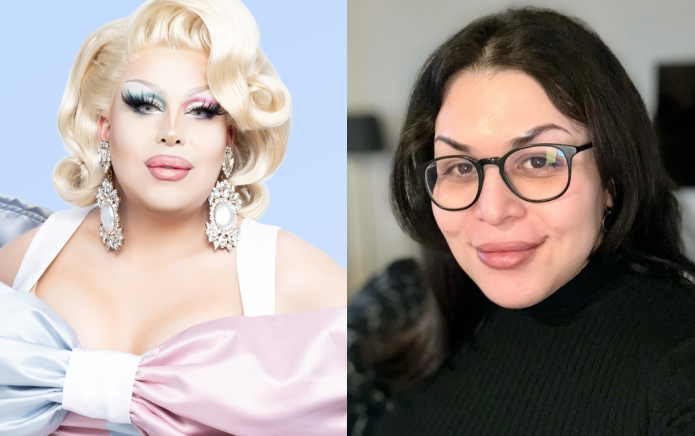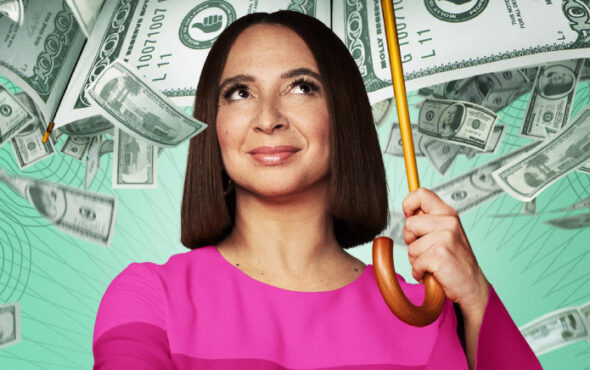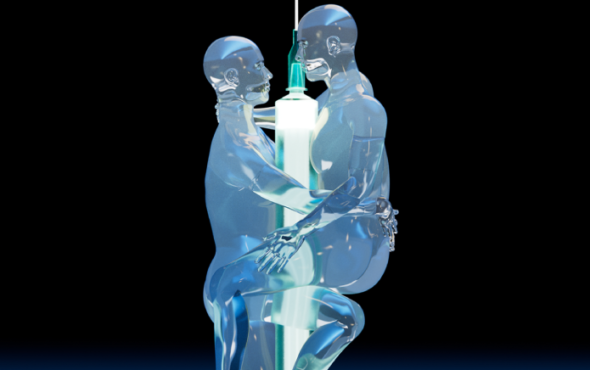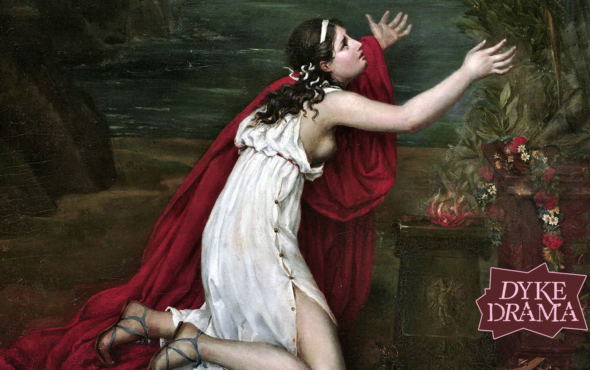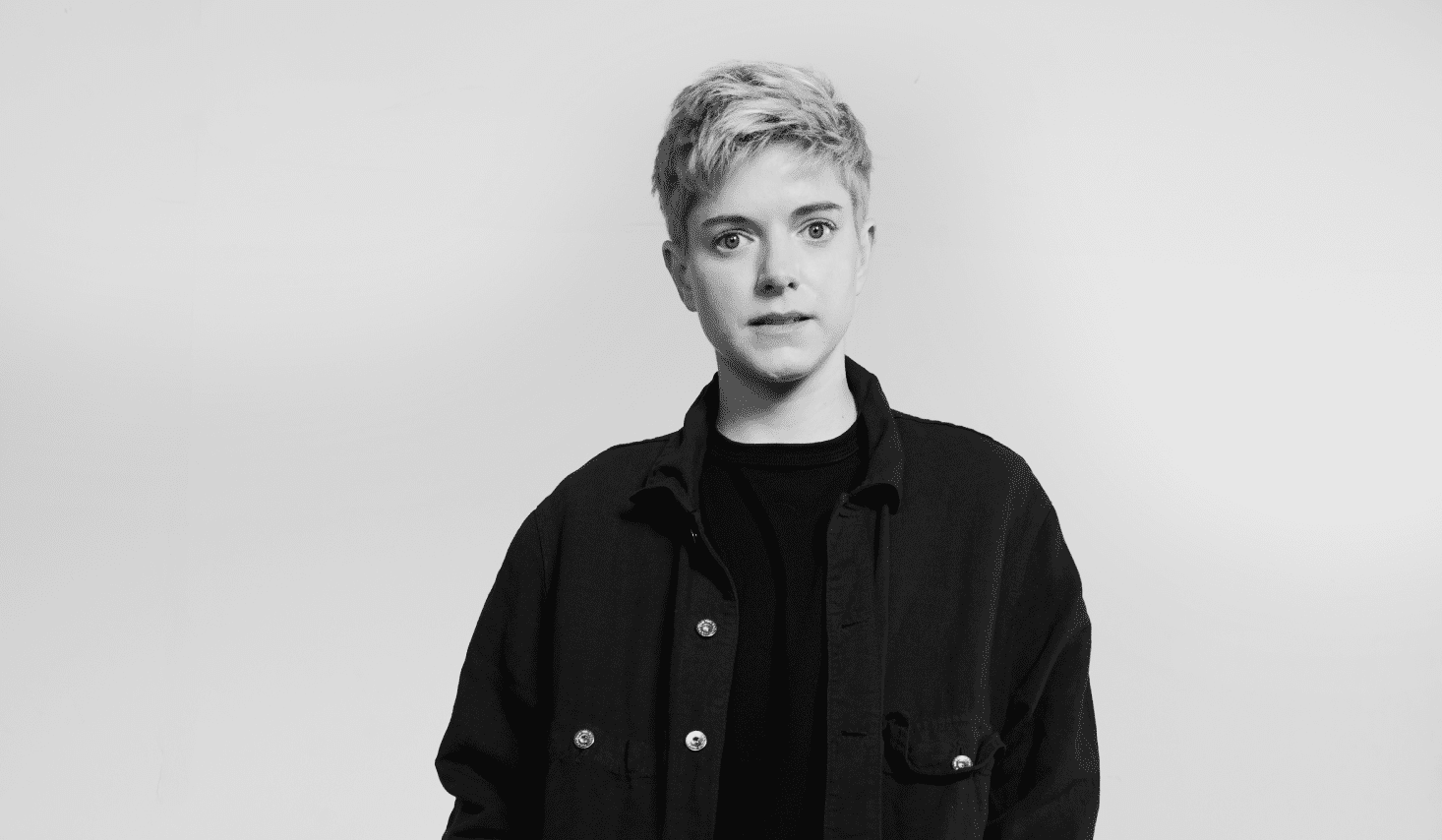
Mae Martin is moving. No, not in the emotional sense (although the ending of Netflix’s Feel Good might get you choked up), they’re quite literally switching up countries. Having “lived all over London” for over a decade, the kind of English comedian is uprooting and moving to Los Angeles, after feeling “untethered” from hopping to from various Airbnbs across the city.
It’s a bright afternoon in LA and the writer, squinting from the incoming sun, confesses they’re “feeling good”. A lot has been happening for Mae Martin — a new unnamed Netflix production is in the works, they’ve been reminiscing about the best meal they’ve ever had, and, soon enough, their latest stand-up set, Mae Martin: SAP, will hit Netflix on March 28.
“Titles are really hard! I don’t know if that’s the right title for the show, but I do really love the concept and that parable at the end of the show. I liked that it’s a synonym for wimpy weakness, which I think we all need to embrace what little worms we all are,” they laugh over Zoom. The ending of SAP either lands or it doesn’t. Martin, who committedly sticks to a short prosaic story at the end of their set, smiles, pleased with how their new comedy special wraps up. “I’ve done that show so much that I sort of enjoy and play up to the reaction. And, truthfully, I just liked the word like the sound of the word SAP.”
Now, shifting their comedy from one side of the world to another, the actor isn’t too bothered about readjusting to the “culture shock”. Instead, Martin’s latest project hones in on more than moving locations; it centres on personal transition. Change, for anyone, is a daunting prospect. Yet, in SAP, it’s Martin’s connection to their past, their ever-churning understanding of identity, and a determined want to be optimistic that makes their storytelling so compelling.
So, with SAP hitting our screens, GAY TIMES sat down with the comedian to discuss their next steps, rehashing puberty, and the fear of getting called out.
The beginning sequence of SAP sees you throwing phones into the fire – that had to feel very comforting…
I wanted it to have an intimate kind of campfire-y storytelling feel. It’s a nice fantasy to just toss your smartphone into a crackling fire — that felt very satisfying. I hope it’ll subliminally remind the audience (or anybody watching at home) to put their phone far away and concentrate. I’m constantly multitasking like I can’t just do one thing. If I’m watching something, I’m on my phone. If I’m in the bath, I’m also playing games of Scrabble online or listening to an audiobook. It’s every minute of my day where I feel like I should be doing four things at once. I really want to stop being like that. Now, I want to be in nature and I want to be present. I think we’re all aware of this. We all want that and say that out loud, but it’s an uphill battle because everything’s designed to get our attention.
You’ve been involved in TV projects such as Feel Good and The Flight Attendant. Does stand-up allow you to reclaim your sense of self in a different medium?
With Feel Good, I wrote it and it was autobiographical with a similar kind of feeling of curation going, ‘This is what I want to put out to the world.’ But, definitely with acting in other people’s projects, you don’t have that same sense of control, which is freeing in a way. Also, I’m a control freak. I like to have ownership over what I’m putting out there, especially these days because in interviews I’m often asked to talk about identity politics and big overwhelming political things. I never finished high school! I’m constantly worried I’m going to put my foot in it or say the wrong thing. I know how I feel. But with stand-up, I’m able to take a minute and think about what I want to say and be in control of the narrative, instead of worrying about what pull quote someone’s going to take about what I said off the cuff about something very serious.
There are some commonalities between Feel Good and The Flight Attendant, with characters who face their own struggles and deal with a sense of ambiguity. In SAP too, you draw on the good, bad and in-between. Do you find it helpful to tap into these undefined creative spaces?
Totally! If I was going to wave one banner, it would be letting people be fluid and nuanced. We live in such a binary world in so many ways. There’s a political binary and there are all kinds of social binaries that we’ve created that don’t exist anywhere in nature. The more we can be malleable and complicated and flawed, the better, I think.
With SAP, what inspired the back-and-forth narrative direction you choose to take?
It jumps around at first and then settles by the end. There’s a thematic cohesiveness and a fragmented type of storytelling, which is kind of how I was feeling when I was writing it and, coming out of the pandemic, feeling like things didn’t make sense. It’s a feeling that the world that we’re in, and the systems that we’re participating in, don’t make logical sense. So, that overwhelming existential dread at that realisation and then harkening back to puberty, where you develop critical thinking, and that sort of feeling as a teenager where you’re peering behind the curtain for the first time and seeing how messed up everything is. It’s kind of about how to feel sane in a slightly insane system.
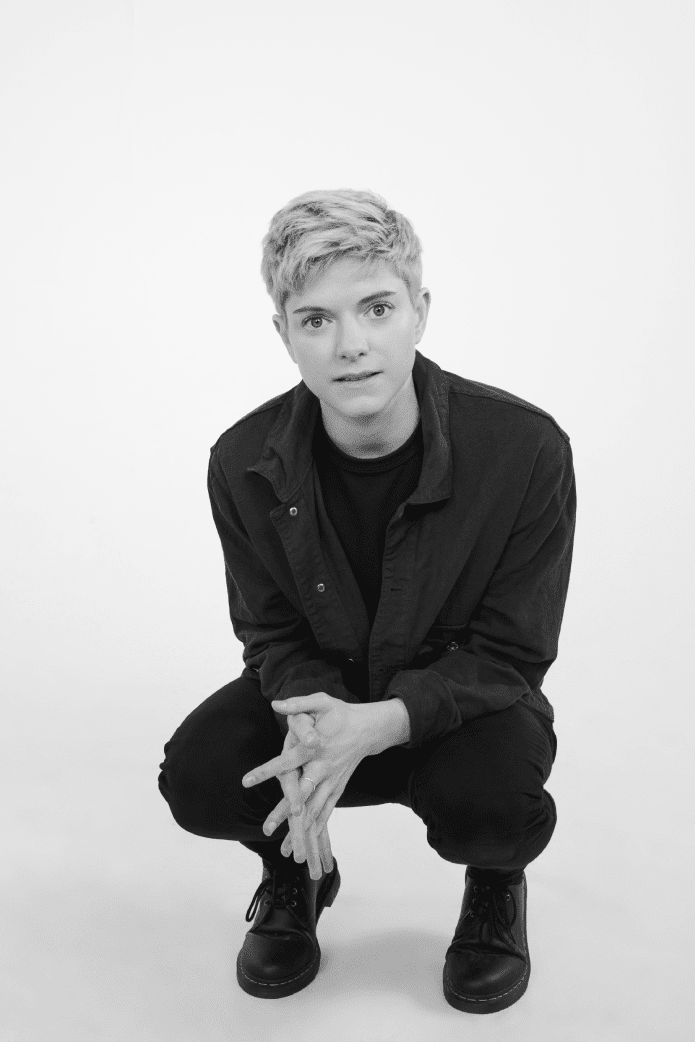
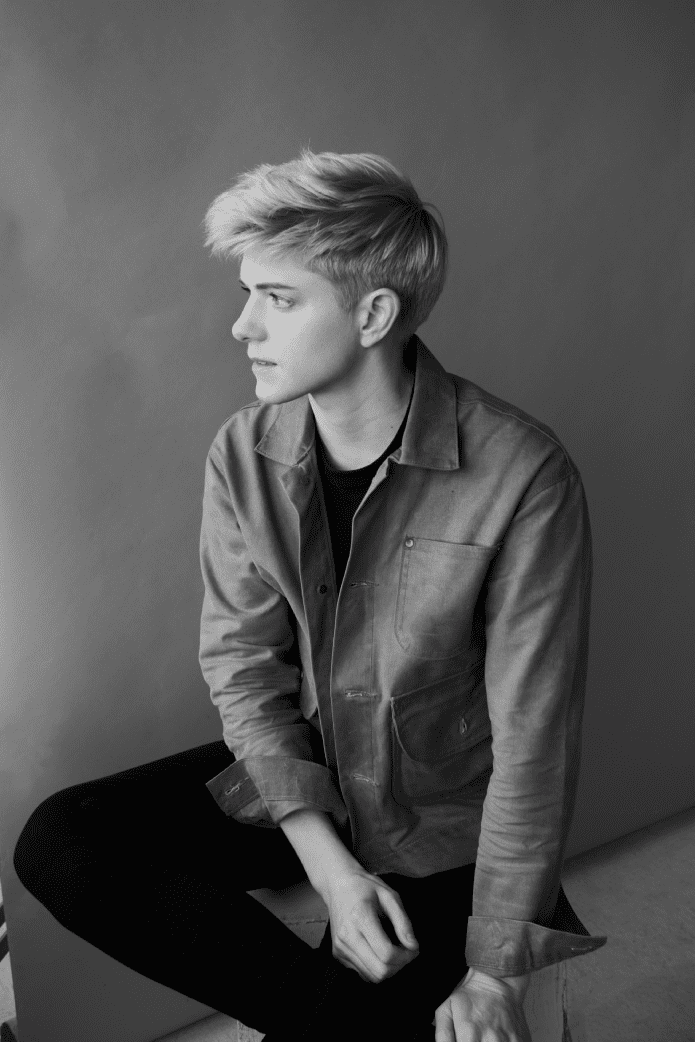
You talk a lot about the internet in your show and the nostalgia around it. Do you spend much time on the internet nowadays?
No, I’m pretty addicted. I’ve never been that big into Twitter. I’ve never been much of a tweeter and I think it’s sort of a little bit hellish. But, I’m pretty addicted to scrolling on Instagram. There just shouldn’t be a feature on your phone that can tell when your thumb is doing that movement of scrolling — I’m definitely guilty of losing myself to Instagram. It does feel like a part of my job and that’s a tricky thing to balance. I started trying to follow good news accounts and then unfollow things that make me sad – it’s tricky.
A portion of SAP engages with language and how it presents identity. For you, what’s your relationship with personal labels?
For most of my adult life, I’ve felt like labels, especially around sexuality, have been something I’ve kind of resented because I always feel like I use them to make myself more palatable for others, and more easily understandable for other people. I think, intuitively we know that those labels don’t really come close to expressing the nuances of human experience and language falls far short of all the beautiful complexity of being alive.
But recently, with gender stuff, I have found it more helpful, which is interesting. Mainly because it was just late in life that I had to wrap my head around my own gender identity, and the language made that clear in my head for me. We didn’t have that language growing up. I’d never heard of non-binary identity so it is nice to know. I’m quite proud to say that I’m trans and non-binary. I hope we’re moving towards a place where we can, just because it’s not the most interesting thing about me, so when it gets constantly flagged as a prefix to your name, it becomes a much bigger part of who you are in the world than it should be. My gender shouldn’t be any bigger a part of me than a cis person’s gender is to them.
Right, there’s never going to be the perfect label…
Also, these communities are not a monolith. I’m always worried that if I’m sort of presented as speaking for a community then I’m gonna say the wrong thing. You can’t represent everyone so all I can do is talk about my own experience.
Feel Good deals quite heavily with gender as a self-autobiographical piece of work and SAP comes across as intimate in a personal way. How do you navigate the boundaries of how much of yourself you’re willing to include?
It’s not like I have a clear rule in my head. It’s more that I know when I’ve hit that line or it feels more case by case where that line is. I definitely try not to directly implicate anyone else and be responsible for my own experience. There are definitely things that I hold back. In general, it takes a couple of years for me to digest something that’s happened and then turn it into something funny, so there’s a delay and a lag. I don’t think there’s anything that’s technically off-limits. It’s more if something feels too bad to talk about instead of rewarding or feels slightly dangerous — it’s just a gut feeling.
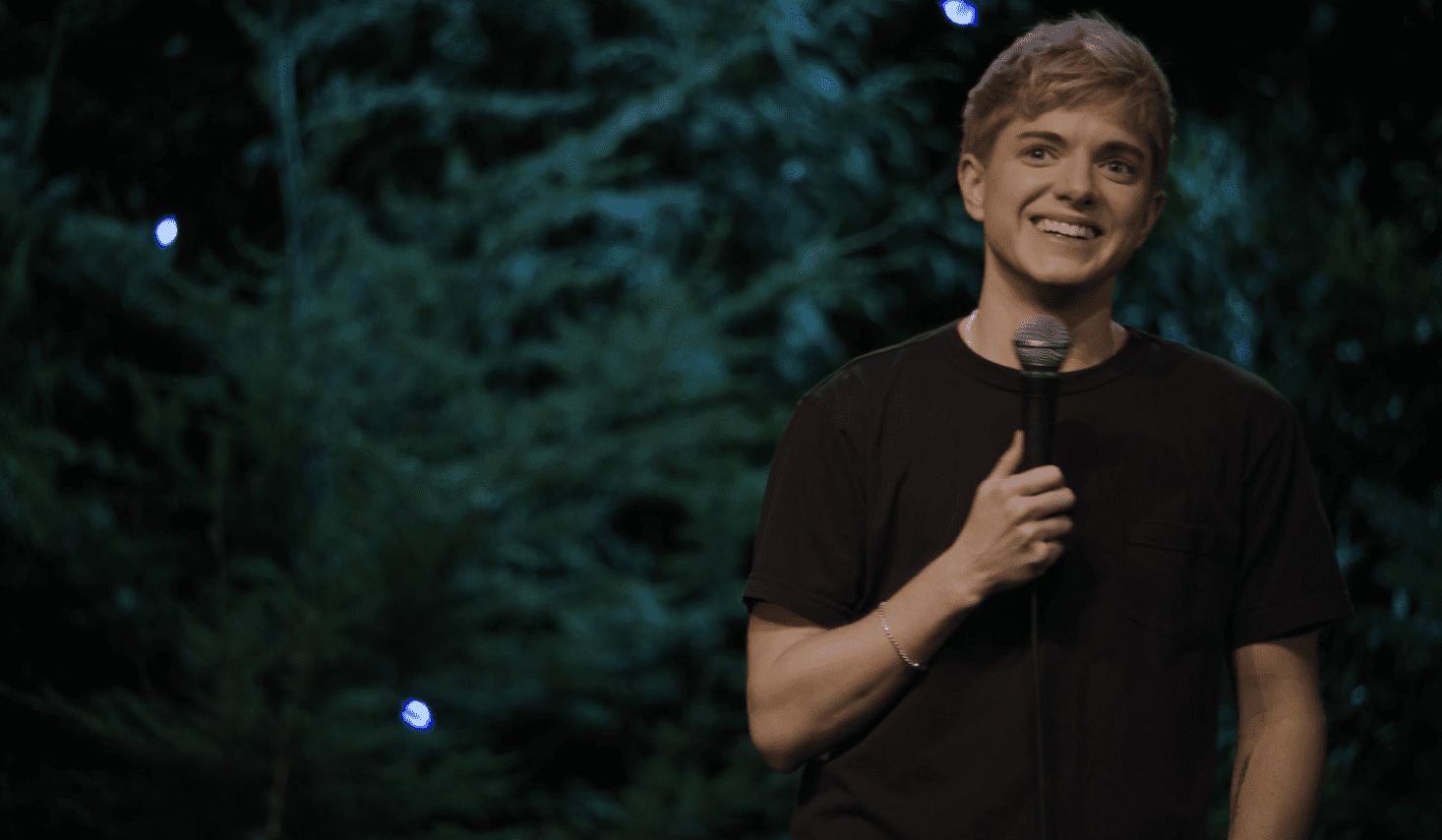
Initially, you might think something feels okay, but that feeling of comfort can change too…
Yeah, totally. Before Feel Good came out, I had a real panic about questioning what I’d done and worrying that I would feel way too exposed. Then, every time I’ve worried about that, I’m always really pleasantly surprised by how much people relate and how universal it feels. I never really talked about my current love life because I feel like it jinxes it or the person involved is never really consenting to be talked about. I don’t really talk about my current love life, so that’s one boundary.
I was really nervous for my parents to see season one. I sent it to them a week before it came out and they were so sweet about it and that was a huge relief. It was just a slow realisation that the world wasn’t gonna end. I was really worried about being topless in it and that this is the most embarrassing thing. I was like ‘Oh god, I’m gonna be on all those sites. People are gonna be screenshotting me.’ And then no one cared at all, and that was really nice to know.
In SAP, you talk about furnishing this figurative shelf with memories (snowglobes). Do you have any favourite snowglobe moments?
Big time, my shelf is populated with those bigger snowglobes. My favourite snowglobes are the little ones about nice baguettes I’ve eaten or like sitting by a campfire in Northern Ontario when I was 12 or certain trips I’ve been on and nice meals I’ve had. I immediately just thought of this polenta that I ate in Italy when I went on a trip with someone I was dating. We found this tiny restaurant and this polenta had a kind of mushroom gravy on it. I think that was the best meal I’ve ever had.
We have to talk about your oatmeal tattoo. Do you see yourself getting another one?
Oh my god, no, I’ve just about learned to love that oatmeal tattoo, but it’s taken a solid 20 years. I wish I could say I was more discerning with my tattoos now, but I’m still getting dumb ones all the time. Hmm, what’s my most recent one? I got, ‘Okay’. It’s things like that. They’re pretty impulsive. I love them. It’s a good reminder of how stupid I am.
Now that SAP is out, what else have you got in the works?
I’m in development for a new TV show with Netflix that hopefully will happen. We’re writing now. I’ve got a couple of movies that I’m writing with my friend Joe [Hampson], who co-wrote Feel Good with me. I just recorded an album, like a serious music album, and I really enjoyed it. I don’t know if it’s any good. I don’t think it’s particularly good, genuinely. I’m not a musician at all. I don’t know if I’ll release it, but I might.
We’ll look out for a Mae Martin world tour! How would you describe your sound?
There’s a full band and it’s a lot of harmonies. I will send you some stuff. It’s a little like The Beatles. I absolutely had the best time in the studio. It was like a childhood dream to be in the studio with some of my friends and write songs.
Mae Martin’s new Netflix comedy special, SAP, is out on March 28.
